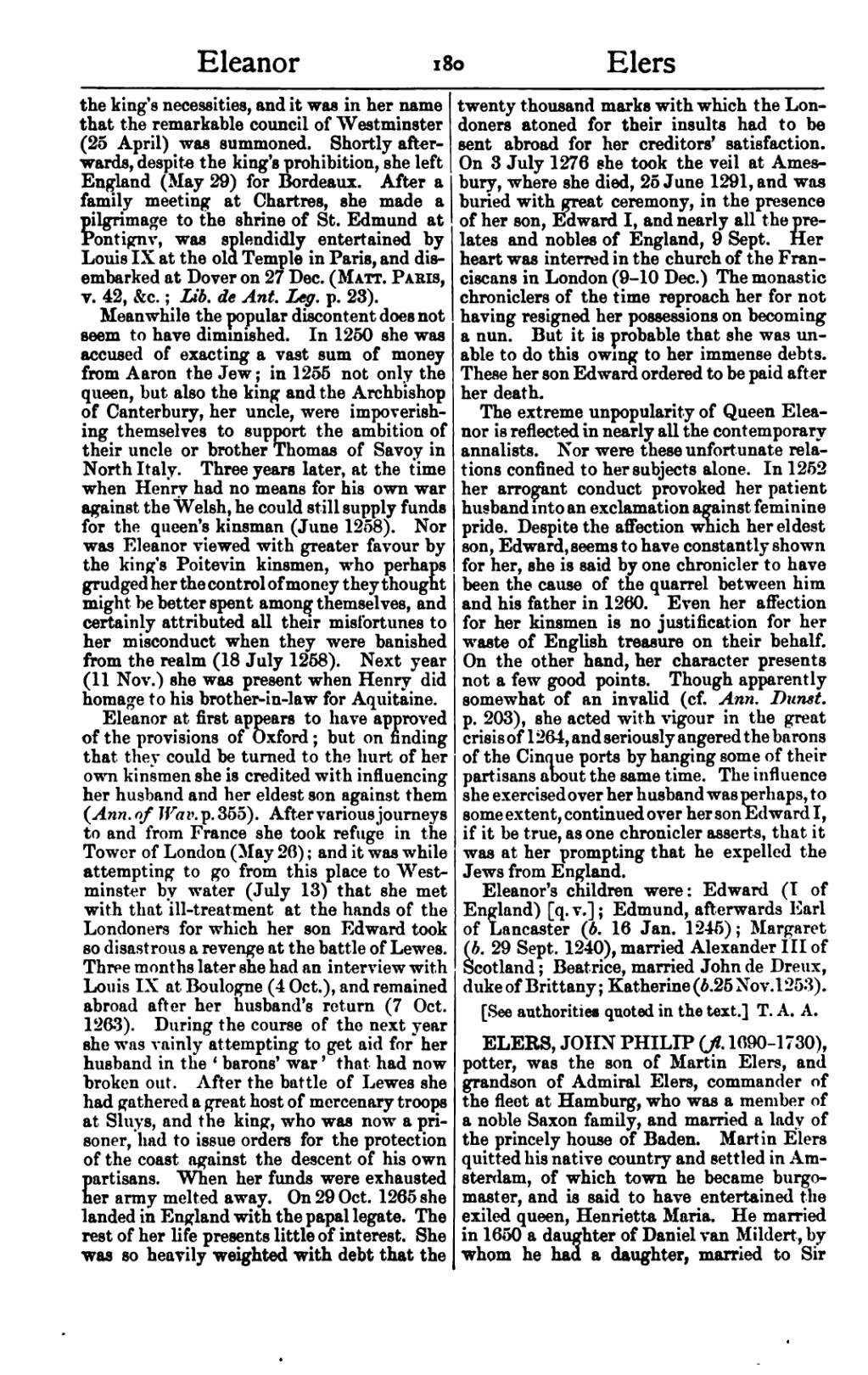the king's necessities, and it was in her name that the remarkable council of Westminster (25 April) was summoned. Shortly afterwards, despite the king's prohibition, she left England (May 29) for Bordeaux. After a family meeting at Chartres, she made a pilgrimage to the shrine of St. Edmund at Pontigny, was splendidly entertained by Louis IX at the old Temple in Paris, and disembarked at Dover on 27 Dec. (Matt. Paris, v. 42, &c.; Lib. de Ant. Leg, p. 23).
Meanwhile the popular discontent does not seem to have diminished. In 1250 she was accused of exacting a vast sum of money from Aaron the Jew; in 1255 not only the queen, but also the king and the Archbishop of Canterbury, her uncle, were impoverishing themselves to support the ambition of their uncle or brother Thomas of Savoy in North Italy. Three years later, at the time when Henry had no means for his own war against the Welsh, he could still supply funds for the queen's kinsman (June 1258). Nor was Eleanor viewed with greater favour by the king's Poitevin kinsmen, who perhaps grudged her the control of money they thought might be better spent among themselves, and certainly attributed all their misfortunes to her misconduct when they were banished from the realm (18 July 1258). Next year (11 Nov.) she was present when Henry did homage to his brother-in-law for Aquitaine.
Eleanor at first appears to have approved of the provisions of Oxford; but on finding that they could be turned to the hurt of her own kinsmen she is credited with influencing her husband and her eldest son against them (Ann. of Wav. p. 355). After various journeys to and from France she took refuge in the Tower of London (May 26); and it was while attempting to go from this place to Westminster by water (July 13) that she met with that ill-treatment at the hands of the Londoners for which her son Edward took so disastrous a revenge at the battle of Lewes. Three months later she had an interview with Louis IX at Boulogne (4 Oct.), and remained abroad after her husband's return (7 Oct. 1263). During the course of the next year she was vainly attempting to get aid for her husband in the 'barons' war' that had now broken out. After the battle of Lewes she had gathered a great host of mercenary troops at Sluys, and the king, who was now a prisoner, had to issue orders for the protection of the coast against the descent of his own partisans. When her funds were exhausted her army melted away. On 29 Oct. 1265 she landed in England with the papal legate. The rest of her life presents little of interest. She was so heavily weighted with debt that the twenty thousand marks with which the Londoners atoned for their insults had to be sent abroad for her creditors' satisfaction. On 3 July 1276 she took the veil at Amesbury, where she died, 25 June 1291, and was buried with great ceremony, in the presence of her son, Edward I, and nearly all the prelates and nobles of England, 9 Sept. Her heart was interred in the church of the Franciscans in London (9-10 Dec.) The monastic chroniclers of the time reproach her for not having resigned her possessions on becoming a nun. But it is probable that she was unable to do this owing to her immense debts. These her son Edward ordered to be paid after her death.
The extreme unpopularity of Queen Eleanor is reflected in nearly all the contemporary annalists. Nor were these unfortunate relations confined to her subjects alone. In 1252 her arrogant conduct provoked her patient husband into an exclamation against feminine pride. Despite the affection which her eldest son, Edward, seems to have constantly shown for her, she is said by one chronicler to have been the cause of the quarrel between him and his father in 1260. Even her affection for her kinsmen is no justification for her waste of English treasure on their behalf. On the other hand, her character presents not a few good points. Though apparently somewhat of an invalid (cf. Ann. Dunst. p. 203), she acted with vigour in the great crisis of 1264, and seriously angered the barons of the Cinque ports by hanging some of their partisans about the same time. The influence she exercised over her husband was perhaps, to some extent, continued over her son Edward I, if it be true, as one chronicler asserts, that it was at her prompting that he expelled the Jews from England.
Eleanor's children were: Edward (I of England) [q. v.] ; Edmund, afterwards Earl of Lancaster (b. 16 Jan. 1245); Margaret (b. 29 Sept. 1240), married Alexander III of Scotland; Beatrice, married John de Dreux, duke of Brittany; Katherine (b.25 Nov. 1253).
[See authorities quoted in the text.]
ELERS, JOHN PHILIP (fl. 1690–1730), potter, was the son of Martin Elers, and grandson of Admiral Elers, commander of the fleet at Hamburg, who was a member of a noble Saxon family, and married a lady of the princely house of Baden. Martin Elers quitted his native country and settled in Amsterdam, of which town he became burgomaster, and is said to have entertained the exiled queen, Henrietta Maria. He married in 1650 a daughter of Daniel van Mildert, by whom he had a daughter, married to Sir
